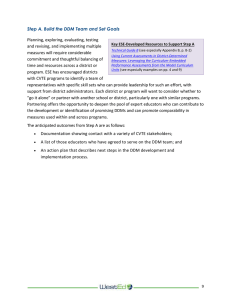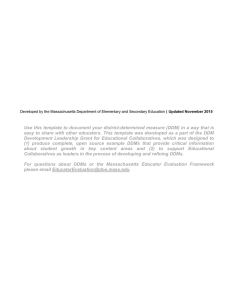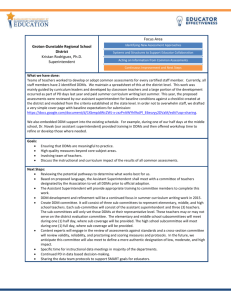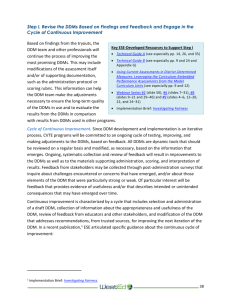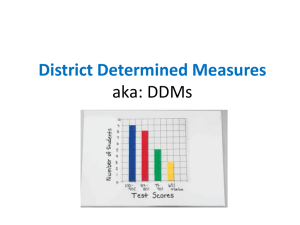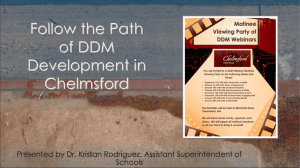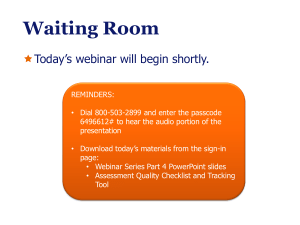Part5
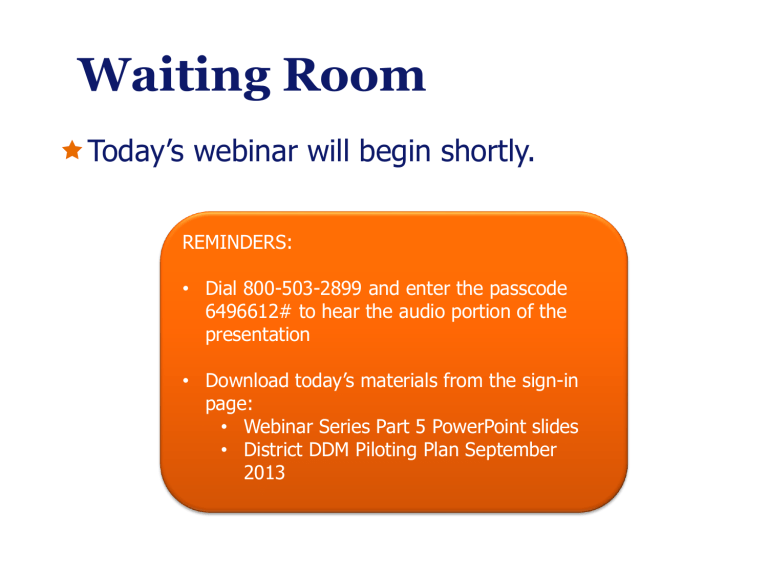
Waiting Room
Today’s webinar will begin shortly.
REMINDERS:
• Dial 800-503-2899 and enter the passcode
6496612# to hear the audio portion of the presentation
• Download today’s materials from the sign-in page:
• Webinar Series Part 5 PowerPoint slides
• District DDM Piloting Plan September
2013
Measuring Student Growth and Piloting District-
Determined Measures
Webinar Series Part 5
Logistics
Q&A
Type your questions into the chat box in the lower right corner of the screen
Recording
Recordings will be archived on our webpage: http://www.doe.mass.edu/edeval/ddm/webinar.html
Supplemental materials
All materials needed to participate in each session will be posted on the sign-in page and archived on our webpage.
2
1
2
3
4
5
6
7
8
Webinar Series
Title
Introduction: District-Determined Measures and
Assessment Literacy
Basics of Assessment
Assessment Options
TA and Networking Session I
Determining the Best Approach to District-
Determined Measures
Measuring Student Growth and Piloting
District-Determined Measures
TA and Networking Session II
Integrating Assessments into Educator Evaluation:
Developing Business Rules and Engaging Staff
Communicating Results
TA and Networking Session III
Sustainability
8/15
9/19
10/24
12/5
12/12
1/23
Date
3/14
4/4
4/25
7/11
7/18
Length
60 minutes
90 minutes
60 minutes
3 hours
60 minutes
Time
4-5pm
4-5:30pm
4-5pm
9am-12pm
4-5pm
60 minutes
3 hours
60 minutes
60 minutes
3 hours
60 minutes
4-5pm
2:30pm-
5:30pm
4-5pm
4-5pm
9am-12pm
4-5pm
Audience & Purpose
Target audience
District teams that will be engaged in the work of identifying, selecting, and piloting District-
Determined Measures
After today participants will understand:
ESE expectations concerning DDM piloting during the 2013-14 school year
Multiple approaches to estimating student growth
Practical steps to take when piloting DDMs 4
Agenda
Updates!
September 2013: List of Pilot DDM Due
DDM Implementation Timeline
Technical Guide B
Key Questions and Considerations
Measuring Student Growth
Piloting
Q&A and Next Steps
5
List of Pilot DDMs – by 9/30/13
All districts must submit a list of the potential DDMs the district will pilot during the 2013-14 school year
Must address the five required pilot areas:
1.
Early grade (K-3) literacy
2.
Early (K-3) grade math
3.
Middle grade (5-8) math
4.
High school writing to text
5.
Traditionally non-tested grades/subject or course (e.g., fine arts, music, p.e.)
ESE template available: http://www.doe.mass.edu/edeval/ddm/
6
DDM Implementation Timeline
April 12 th – Commissioner’s Memorandum
2013-14 now a year for piloting DDMs
Established five required pilot areas
September 2013: Submit list of Pilot DDMs
February 2014: Submit final plan for determining
Impact Ratings based on the DDMs for all educators by the end of the 2015-2016 school year.
Original
Timeline
2013-14
Collect data (Year1)
Revised
Timeline (as of
April 2013)
Research and pilot potential
DDMs
2014-15
Collect data
(Year 2),
Issue 1 st Student Impact
Ratings
Collect data (Year1)
2015-16
Collect data,
Issue Student Impact
Ratings
Collect data
(Year 2),
Issue 1 st Student Impact
Ratings
7
DDM Implementation Timeline
August 15 th – Commissioner’s Memorandum
Builds on earlier timeline
2013-14 remains a year for piloting
September submission remains the same
Two shifts:
February submission (final plan) shifts to June 1, 2014
Commissioner intends to provide extension request process
8
DDM Implementation Timeline
August 15 th – Commissioner’s Memorandum
Extension requests will be coupled with June 2014 submissions
One-year extension of DDM implementation for particular grade(s)/subject(s) or course(s) for which the district has not yet identified DDMs.
Blanket extensions will not be granted.
Use judiciously - not all districts will need an extension
Not a pause button. 9
Technical Guide B:
Measuring Student Growth and
Piloting District-determined
Measures
Technical Guide B
Publication Date: August 30 th , 2013
Content:
Introduction
Key Questions and Considerations
Measuring Student Growth with DDMs
Piloting DDMs
11
Key Questions and
Considerations for
District-determined
Measures
Entry point to DDM work:
Two Focus Questions
Is the measure aligned to content?
Is the measure informative?
13
Entry point to DDM work:
Two Focus Questions
Is the measure aligned to content?
Does it assess what is most important for students to learn and be able to do?
Does it assess what the educators intend to teach?
14
Entry point to DDM work:
Two Focus Questions
Is the measure informative?
Do the results of the measure inform educators about curriculum, instruction, and practice?
Does it provide valuable information to educators about their students?
Does it provide valuable information to schools and districts about their educators?
15
Five Considerations
1.
Measure growth
2.
Common administration procedure
3.
Common scoring process
4.
Translate to an Impact Rating
5.
Comparability
16
Low, Moderate, or High…
Student growth versus…
Educator Impact
17
What is comparability?
Comparable within a grade, subject, or course across schools within a district
Identical measures are recommended
Comparable across grade or subject level district-wide
Impact Ratings should have a consistent meaning across educators; therefore, DDMs should not have significantly different levels of rigor
18
Measuring Student
Growth with DDMs
Approaches to Measuring
Student Growth
Pre-Test/Post Test
Repeated Measures
Holistic Evaluation
Post-Test Only
20
Pre/Post Test
Description:
The same or similar assessments administered at the beginning and at the end of the course or year
Example: Grade 10 ELA writing assessment aligned to College and Career Readiness Standards at beginning and end of year
Measuring Growth:
Difference between pre- and post-test.
Considerations:
Do all students have an equal chance of demonstrating growth?
21
Repeated Measures
Description:
Multiple assessments given throughout the year.
Example: running records, attendance, mile run
Measuring Growth:
Graphically
Ranging from the sophisticated to simple
Considerations:
Less pressure on each administration.
Authentic Tasks
22
# of errors
20
10
0
40
30
70
60
50
Repeated Measures Example
Running Record
Running Record Error Rate
Low Growth
High Growth
Mod Growth
23
Date of Administration
Holistic
Description:
Assess growth across student work collected throughout the year.
Example: Tennessee Arts Growth Measure System
Measuring Growth:
Growth Rubric (see example)
Considerations:
Rating can be challenging & time consuming
Option for multifaceted performance assessments
24
Details
Holistic Example
1 2 3 4
No improvement in the level of detail.
One is true
* No new details across versions
* New details are added, but not included in future versions.
* A few new details are added that are not relevant, accurate or meaningful
Modest improvement in the level of detail
One is true
* There are a few details included across all versions
* There are many added details are included, but they are not included consistently, or none are improved or elaborated upon.
* There are many added details, but several are not relevant, accurate or meaningful
Considerable
Improvement in the level of detail
All are true
* There are many examples of added details across all versions,
* At least one example of a detail that is improved or elaborated in future versions
*Details are consistently included in future versions
*The added details reflect relevant and meaningful additions
Outstanding
Improvement in the level of detail
All are true
* On average there are multiple details added across every version
* There are multiple examples of details that build and elaborate on previous versions
* The added details reflect the most relevant and meaningful additions
Example taken from Austin, a first grader from Anser Charter School in Boise,
Idaho. Used with permission from Expeditionary Learning. Learn more about this and other examples at http://elschools.org/student-work/butterfly-drafts
25
Post-Test Only
Description:
A single assessment or data that is paired with other information
Example: AP exam
Measuring Growth, where possible:
Use a baseline
Assume equal beginning
Considerations:
May be only option for some indirect measures
What is the quality of the baseline information?
26
Examples
Portfolios
Measuring achievement v. growth
Unit Assessments
Looking at growth across a series
Capstone Projects
May be a very strong measure of achievement
27
Piloting District
Determined Measures
Piloting DDMs
Piloting:
Test
Analyze
Adjust
Repeat
Being strategic and deliberate:
Collaboration
Iteration
Information
29
Pilot Steps:
1.
Prepare to pilot
Build your team
Identify content to assess
Identify the measure
Aligned to content
Informative
Decide how to administer & score
2.
Test
Administer
Score
3.
Analyze
4.
Adjust
30
Analyzing Results:
Example Focus Questions
Is the measure fair to special education students?
Is there differences in score due to rater?
Is growth equal across the scale?
31
Analyzing and adjusting:
Each DDM should have:
1.
Directions for administering
2.
Student directions
3.
Instrument
4.
Scoring method
5.
Scoring directions
32
Student Impact Rating Rollout:
2013-14 School Year
September
2013:
Decide which DDMs to pilot and submit list to ESE.
October 2013 –
May 2014:
June 2014:
Conduct pilots and research potential DDMs in other disciplines
Determine final plan for DDM implementation beginning in SY 2014-2015 (request extension for particular grades/subjects or courses)
SY 2014-2015 Implement DDMs and collect Year 1 Student Impact
Rating data for all educators (with the exception of educators who teach the particular grades/subjects or courses for which an extension has been granted
SY 2015-2016 Implement DDMs, collect Year 2 Student Impact Rating, and determine and report Student Impact Ratings for all educators (with the exception of educators who teach the particular grades/subjects or courses for which a district has received an extension).
33
Resources
Existing
ESE Staff
Part VII of the Model System
Technical Guide A
Assessment Quality Checklist and Tracking Tool
Assessment Literacy Webinar Series
Materials from Technical Assistance sessions
Commissioner's Memorandum
What’s Coming
Technical Guide B (August 30 th )
Exemplar DDMs (August 30 th )
Other Supporting Materials
34
Register for
Webinar Series Part 6
Part 6: Determining How to Integrate
Assessments into Educator Evaluation:
Developing Business Rules and Engaging Staff
Date: October 24, 2013
Time: 4-5pm EST (60 minutes)
Register: https://air-event500.webex.com/airevent500/onstage/g.php?d=592783893&t=a 35
Questions
Contact
Samantha Warburton swarburton@doe.mass.edu
Craig Waterman at cwaterman@doe.mass.edu
Ron Noble at rnoble@doe.mass.edu
Feedback
Tell us how we did: http://www.surveygizmo.com/s3/1336186/Dist rict-Determined-Measures-amp-Assessment-
Literacy-Webinar-5-Feedback
36
